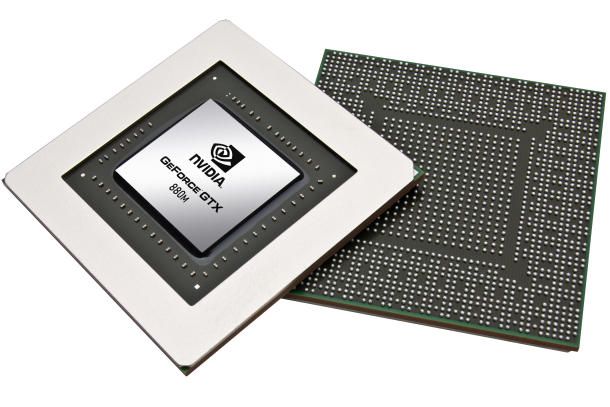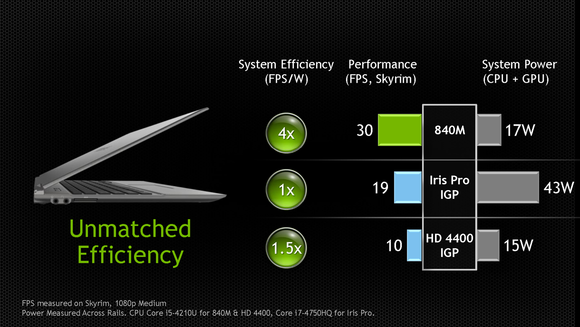Nvidia's new Maxwell architecture is extremely power efficient, which makes it the obvious choice for mobile graphics, but Nvidia does not have high-end parts based on the new architecture just yet. Most of the line-up remains Kepler-based, while the 820M is based on the Fermi core.

Nvidia claims the flagship GTX 880M is about 15 percent faster than last year's GTX 780M, despite the fact that it is based on the same architecture. Don't expect spectacular gains on other Kepler-based SKUs, either.
The GTX 850M is the most interesting part and Nvidia claims it can run AAA games at 1080p devices as thin as 0.82 inches - while at the same time outpacing its predecessors by about 30 percent. The card should deliver playable framerates in most titles on high settings and 1080p resolution.
Interestingly, Nvidia used the opportunity to bas Intel graphics rather than AMD's mobile solutions. Nvidia claims 85 percent of games are not playable on Intel HD Graphics 4400 GPUs and as many as 75 percent are not playable on Intel Iris 5100 graphics which are still reserved only for high-end Haswell parts. Nvidia's idea of playable is 30fps at 1366x768, which we would call barely playable.
The Intel bash also revealed some interesting info on Intel's power efficiency. An Intel Iris Pro system delivers 19fps in Skyrim while using 43W, while a system with Nvidia 840M graphics consumes only 17W and delivers 30fps. However, we find the claim misleading to say the least, as it is a case of pears and apples - the CPU used in the NV system was the Core i5-4210U, while the Iris Pro system featured a Core i7-4750HQ. The latter is a quad-core behemoth with a 47W TDP, while the Core i5-4210U is a frugal dual-core with a 15W TDP.

What's more, the test also included an HD 4400 system based on the same Core i5-4210U. It delivered just 10fps, but its power consumption was a mere 15W. Adding discrete 840M graphics to the system pushed up the CPU + GPU consumption to 17W while tripling the frame rate. This is a fair comparison, as it indicates Intel graphics aren't very efficient under load, but that's not exactly headline grabbing news.
Nvidia already has a number of design wins for new 800-series mobile parts and the list includes Alienware, Razer, MSI, Asus, Gigabyte and Lenovo. The company has dominated the mobile market for years, leaving AMD with scraps. It is highly unlikely AMD will be able to turn things around anytime soon, but it might have a fighting chance with new 20nm parts later this year.




